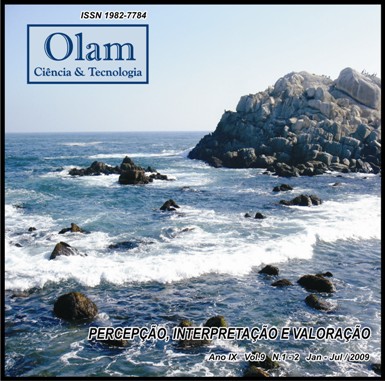PERCEPÇÃO AMBIENTAL NOS ESPAÇOS DE CULTURA: CENTRO HISTÓRICO DE CUIABÁ
Palavras-chave:
Percepção Ambiental. Fenomenologia. Espaços de Cultura. Centro Histórico da Cidade. Cuiabá. Turismo Cultural.Resumo
O presente trabalho textualiza reflexões hauridas da experiência humana no mundo, vivenciadas por seus autores em pesquisa bibliográfica e de campo, perspectivada pela fenomenologia de Maurice Merleau-Ponty, cujo conceito de espacialidade emprestamos, dialogamos, ademais, com a fenomenologia da paisagem, descrita por Tuan, sobretudo a categoria espacial topofilia e topofobia. O trabalho aponta a conexão indesligável que a percepção exerce, como força motriz fundante da realização da síntese da experiência humana vivida e saboreada, reflexivamente, no fenômeno mundo-vida. Experiência, essa, que proporciona direção para o projeto educacional da vida pessoal e coletivo. Inexiste hiato entre o espaço exterior e o interior. Toda espacialidade sofre a humanização ou a desumanização advinda do enlaçamento estabelecido entre eu-outro-mundo. O centro histórico da cidade de Cuiabá, capital do Estado de Mato Grosso (Brasil), com ênfase às suas praças, constitui o lócus sobre o qual nos debruçamos para compreender a natureza e a identidade da percepção humana, expressa, por nós, em linguagem. As percepções espaciais incidem ressignificando o espaço, e as implicações deste para a educação ambiental, mormente as dimensões educativas da atividade turística. A imersão espacial exterior, num encontro intencionado com o mundo, traz a imperiosa necessidade de um acerto de contas com o tempo e espaço da cultura dentro de si próprio. O exercício do turismo cultural exige uma reeducação da percetualização do espaço e do tempo que implica o redimensionamento teórico-metodológico das novas tarefas para um ambiente físico, humano e espiritual, outro. Implica outras criações e ampliação de políticas públicas de Estado. Palavras-chave: Percepção Ambiental. Fenomenologia. Espaços de Cultura. Centro Histórico da Cidade. Cuiabá. Turismo Cultural. ABSTRACT The present work textualizes ideas imbibed from the human world experience, experienced by their authors in researches from literature and field, perspectivated by the phenomenology of Maurice Merleau-Ponty's, which concept of spatiality was lend, in dialogue with the phenomenology of landscape, described by Tuan, categorialized as topophilia and topophobia. The work shows the non-turn offable connection that perception has, while a basis driving force of the realization of the synthesis of human experience lived-and-tasted, reflexively, in life-world phenomenon, which provides direction for the educational project of personal live and collective. The non-existent gap between the exterior and interior space. All spatiality suffers humanization or dehumanization which comes from the non-turn offable relations established between self-other-world. The historic center of the city of Cuiaba, capital of State of Mato Grosso (Brazil), with emphasis on squares, constitute itself a locus that creates an opportunity of look over the nature of human perception and express it in language. These revisited dimensions resignify space(s) and its implications for the environmental education, especially, to the educational dimension of tourism. The activity of immersion outer space, intentional encounter with the world, it is imperative to settle accounts with the time and space within himself, within the space of culture. These dimensions involve new theoretical and methodological tasks to the physical environment, human and spiritual. Key words: Environmental Perception. Phenomenology. Cultural Spaces. Historic Center of the City. Topophilia. Cuiabá (State of Mato Grosso).Downloads
Como Citar
PASSOS, L. A., & BORDEST, S. M. L. (2009). PERCEPÇÃO AMBIENTAL NOS ESPAÇOS DE CULTURA: CENTRO HISTÓRICO DE CUIABÁ. OLAM: Ciência & Tecnologia, 9(2). Recuperado de https://www.periodicos.rc.biblioteca.unesp.br/index.php/olam/article/view/3265
Edição
Seção
ARTIGOS







